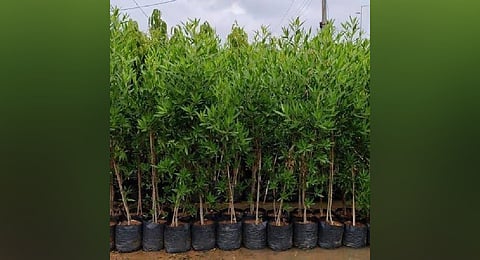

HYDERABAD: Assembly Speaker Gaddam Prasad Kumar’s suggestion that the government remove Conocarpus trees due to their alleged adverse effects on the environment and human health — claiming that these trees absorb oxygen and release carbon dioxide — has set off a debate among the public.
Over the years, successive state governments encouraged planting saplings to combat deforestation. Under the BRS regime, the Haritha Haram programme was launched with much fanfare. Officials stated that approximately 200 crore saplings have been planted across Telangana in towns and villages, with a sizeable number being Conocarpus. These trees were also planted along state and national highways.
Officials reported that the germination rate of these trees is 99%. For this reason, local authorities selected these saplings for extensive planting across the state. Sources said, “The then BRS government set targets for officials to protect trees planted under the Haritha Haram programme. Since these trees have a high germination rate, their survival was easier, leading to their widespread plantation across the state.”
However, after receiving objections from various quarters, the state government stopped planting these trees three to four years ago.
In several instances, due to public pressure, sarpanches and local leaders removed these trees at their own expense.
Harmful or not?
Environmentalists are divided on the issue. Some argue that these trees do not pose any harm to humans, while others claim they have a significant impact. Several states, including Andhra Pradesh, Tamil Nadu and Gujarat, have banned planting these trees and begun removing them.
Speaking to TNIE, environmentalist Prof Donthi Narasimha Reddy stated that research indicates these trees can cause allergies in humans. He said, “This is not a native species. Many countries are removing these trees and discouraging their planting. They also deplete groundwater resources.”
However, another environmentalist, Prof K Purushottam Reddy, told TNIE that there was no evidence that these trees have any negative impact on the environment or human health. He said, “There is no comprehensive research on these trees. No scientific studies have been conducted on their impact. Without scientific evidence, how can we blame a tree?”
While banning Conocarpus tree plantations, the Tamil Nadu government cited potential health risks. It noted that these trees could trigger respiratory issues such as allergies, asthma and common cold symptoms.
The official order stated, “During the flowering season, the tree releases large amounts of pollen, which spread across surrounding areas, affecting people living and working nearby. Numerous cases of pollen-related illnesses have been reported.”
In July 2024, AP Deputy Chief Minister Pawan Kalyan annou-nced a ban on Conocarpus trees. However, this was challenged by social activists in court.
Conocarpus trees, native to Africa, were initially introduced in India as ornamental plants. They are found in coastal and riverine areas of Somalia, Djibouti and Yemen and are widespread in the Horn of Africa, the Arabian Peninsula and South Asia.